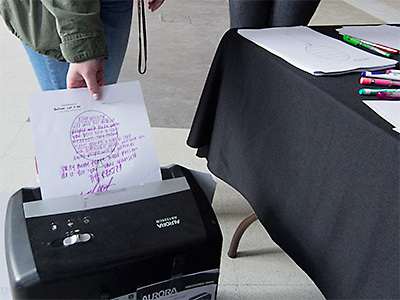
As final exam time rolled around, students and staff were able to "Let Go of Stress with a Paper Balloon" at the lunch event sponsored by TMCC's new T-RAP club.
A spirit of catharsis was perceptible in groups of students gathered at the “Let Go of Stress with a Paper Balloon” event table sponsored by a new student club, TMCC Recovery and Prevention (T-RAP).
Between research papers and finals, Truckee Meadows Community College students and staff wrote down frustrations on printed paper balloons and pushed them with gusto into the paper shredder operated by the club’s advisors, Kristen DeMay, Counselor and Jen O’Bryan-Taft, Re-Entry Specialist at TMCC. Shredding the paper is symbolic for letting go of a stressful item, and the paper will be recycled.
Comments heard were all favorable and energetically spoken. “That felt good – a relief,” said one student. Another said “What a great idea.”
After letting go of the frustration, resentment or point of stress, free lunch snacks were offered before they rushed off to their next class or study session.
Taylor Hatfield, Vice President of T-RAP, and Samuel Jones, Secretary for the new club, were greeting people, eager to share stories or answer questions. Hatfield is a Psychology major who returned to TMCC after taking a break from school to work and start her family. She said that the NRAP community who meets in the Counseling and Re-Entry Center was welcoming as she came back into the academic world.
“To have a sense of support and community is amazing,” Hatfield said. “It really helped me get through my first semester. When I expressed something stressful, someone would say, ‘you’re really resilient’ and that’s really encouraging. It’s nice to have a place to go between classes.”
Now, Hatfield has started leading meetings on Mondays and Wednesdays in the NRAP center, Red Mountain Building, room 325-J. The topics for the get-togethers are mutual support, sharing successes, encouraging a hopeful outlook and discussing positive aspects of recovery from any habits or addictive behaviors.
NRAP is a project of the Center for the Application of Substance Abuse Technologies (CASAT), an academic program at the University of Nevada, Reno, and sponsors communities of assistance for students who choose to live a healthy and sober lifestyle. NRAP is funded by the Stacie Mathewson Foundation. TMCC’s NRAP community was modeled after the UNR program.
In NRAP, a lead professional counselor and student worker oversee a menu of activities such as Wellness Walk-Recovery Focus, Drop-In at the TMCC Cafe and AA meetings. Hours, events and services are listed on the NRAP site.
The TMCC NRAP community is successful and growing, and students became enthusiastic to form their own T-RAP organization, a student club recognized by the TMCC Student Government Association (SGA), DeMay said.
Brandon Pausa is President of the T-RAP club and also the student worker in NRAP.
“We have an open office currently in the counseling center Mondays through Wednesdays from 9 a.m. until 5 p.m.,” Pausa said. “Here we host meetings and allow students to interact with each other and support recovery within the group. Next semester we project more participation as the word gets out that we have recovery groups here. Of course everyone is invited to attend meetings. Yes, more are always welcome.”
One of the goals of the club is to give back and help peers to not feel alone. Hatfield said that holding on to stress or resentments can also be isolating.
“Resentments can cause isolation and tunnel vision,” she said. “If you can acknowledge them, then you can learn from them. Resentments cloud your judgement and your vision and take a lot of space in your heart.”
Part of the “Let Go of Stress with a Paper Balloon” event was to help others release something hurtful that blocks personal growth.
“Resentments are very toxic and it’s hard to let go of them,” Hatfield said. “It’s a crucial step for people in recovery, too. Many times, people find recurring themes in their resentments and it helps to identify them.”
Jones agreed.
“Holding a resentment keeps me back from accomplishing things I’ve dreamed of,” he said. “Resentment is garbage for the soul.”
Jones is an applied science major in automotive, and said that being in the club has helped him with the sudden stresses or panic that can be part of school project deadlines. He also agreed that finding those returning themes in stress or resentments helps with getting past something that keeps people from repeating mistakes.
“There tend to be patterns,” Jones said. “If you can identify the patterns, you can recognize them and do something about it.”
DeMay added that research has proven students in collegiate recovery communities typically have a higher GPA, higher retention rate and higher graduation rate than the general university population.
“If they have a connection to another person, whether it’s another student, or a staff member, it helps them succeed; to graduate,” she said.
For more information about NRAP, call 775-673-7060 or contact Kristen DeMay.






